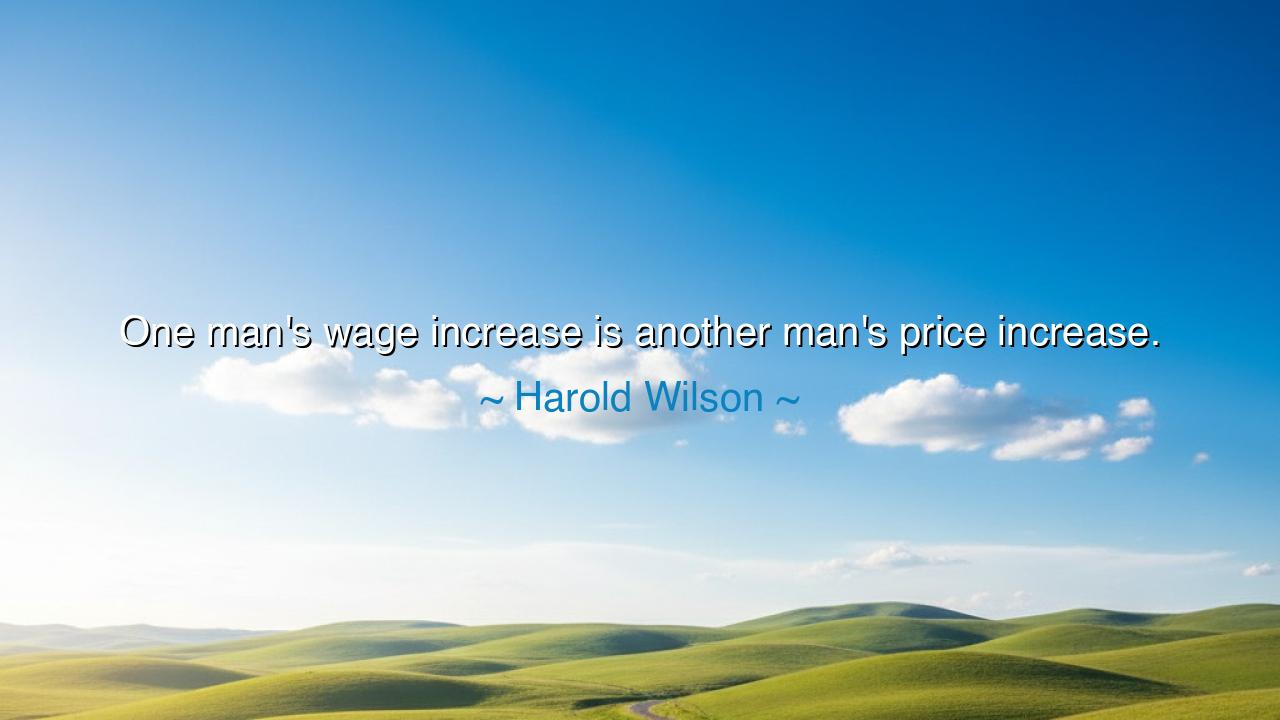
One man's wage increase is another man's price increase.






Hearken, O children of commerce and the toil of men, to the words of Harold Wilson, a sage of worldly matters: "One man's wage increase is another man's price increase." In this utterance lies the eternal balance of human endeavor, the unseen threads that weave the fates of laborer and merchant, producer and consumer. The economy of life is no simple river; it is a complex web where every gain, every rise, bears a shadow upon another, and the world turns in the subtle interplay of cause and consequence.
In the forge of human society, the raising of one man’s wage is a noble act, a recognition of his worth, a reward for effort and dedication. Yet, Wilson illuminates the hidden truth: in the alchemy of trade, such increase often manifests elsewhere as a rise in prices, as the merchant or artisan seeks to balance the scales. This is no mere complaint, but a revelation of the delicate reciprocity that governs all earthly transactions, the invisible hand that binds prosperity to cost.
The ancients, too, spoke of such interconnectedness, calling it the law of measure and balance. To lift one without heed of the other is to invite imbalance, a storm upon the careful fabric of society. Each act of reward carries a counterweight, each joy a shadow, each gain a price, and in this eternal rhythm, the wise discern both merit and consequence, navigating life with eyes wide and heart tempered.
Yet this teaching is not merely of gold and coin; it is a mirror of human relationships and fairness. Just as the world of labor and commerce is intertwined, so too are our lives bound by cause and effect, by reciprocity and consequence. To act without awareness of this network is to stumble, to act with insight is to move with harmony, and in this lies the wisdom of foresight.
Thus, O seekers of understanding, let these words lodge in your hearts: every reward bears its reflection, every uplift is accompanied by a shadow. The dance of wages and prices is a lesson in equilibrium, reminding us that life’s gifts are never solitary, and that the measure of justice lies in the vision to see both sides of the scales. In such understanding, one walks the path of prudence, honoring both labor and life in the eternal commerce of the world.






TNNguyen Thao Nguyen
Wilson’s quote strikes me as a warning about the limits of wage increases in an inflationary economy. While it’s true that raising wages can help workers, it often leads to price increases, which can undermine the benefits. Is this just a natural part of economic systems, or are there alternative ways to improve the quality of life without creating a cycle of rising wages and prices? Could stronger regulation or wage policies help?
MPmy ptt
Harold Wilson's quote makes me think about how interconnected wages and inflation are. If wages go up, businesses often raise prices to maintain their profit margins. But should that discourage wage increases altogether? Perhaps the real issue is not the wage itself but the cost of living and the economic systems that drive inflation. Can we find ways to decouple wages from this constant cycle of price hikes?
VMPham Van Minh
The idea behind this quote reflects a very real dilemma. When wages rise, companies often adjust their pricing to cover the added costs, meaning consumers might not see the benefits. But is the solution to this really to halt wage increases, or should we focus on reducing the factors that cause prices to rise in the first place? Could a more sustainable approach to wages and pricing exist?
TNAnh Tuyet Nguyen
Wilson's statement feels very relevant to today’s economic climate. We hear a lot about wage increases, but are they really improving people’s quality of life if everything becomes more expensive? It raises the question: Should wages be tied to something beyond just inflation, such as productivity? How can we ensure that a wage increase doesn’t just translate into higher costs for the same goods and services?
JJuk
This quote really brings to light the balance (or imbalance) between wages and prices. While higher wages are supposed to make life easier, they often end up fueling inflation, which can negate the benefits. I wonder, though—can there ever be a way to increase wages without triggering this price hike cycle? Is there a solution that would allow workers to benefit without creating inflationary pressure?